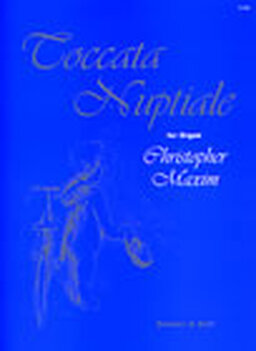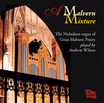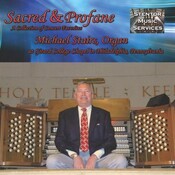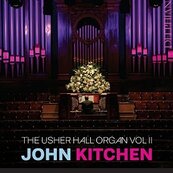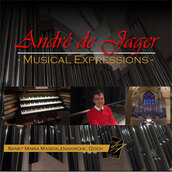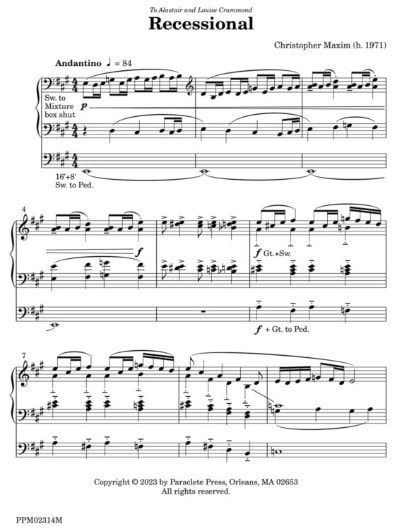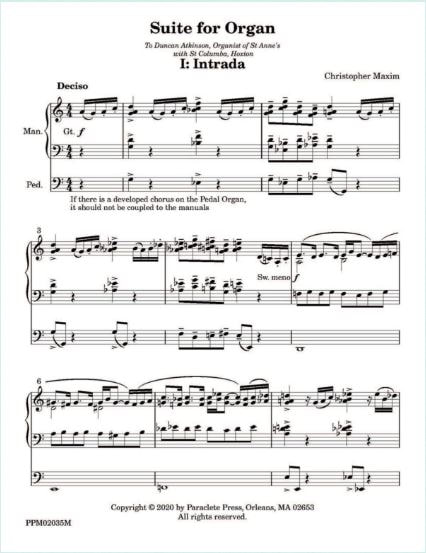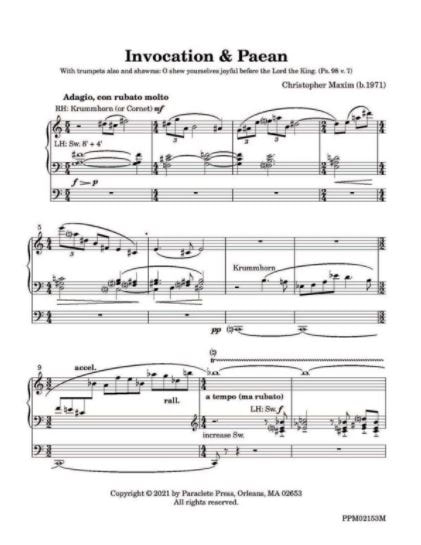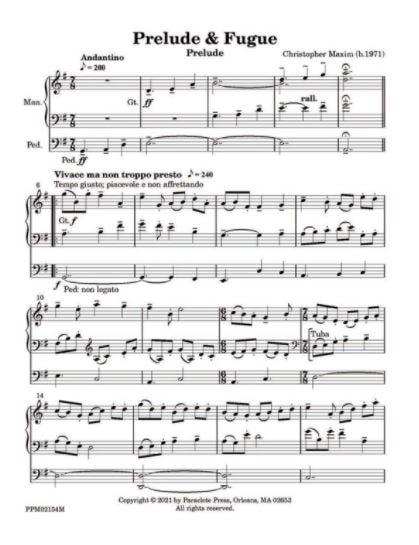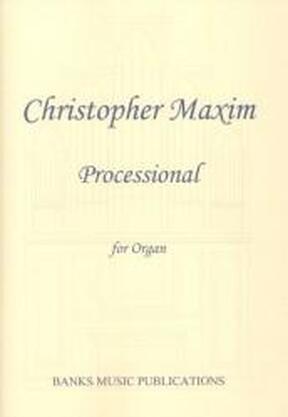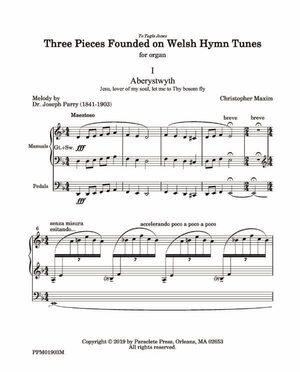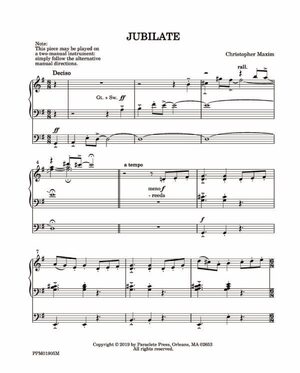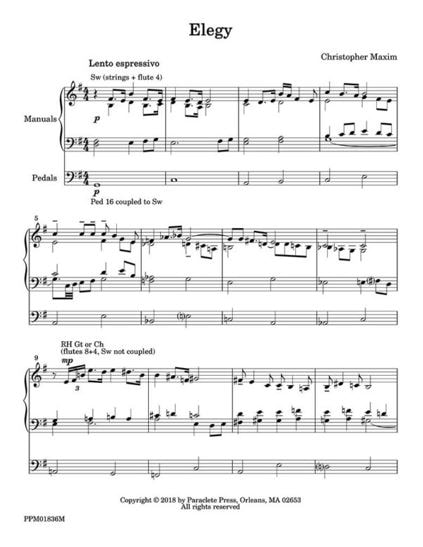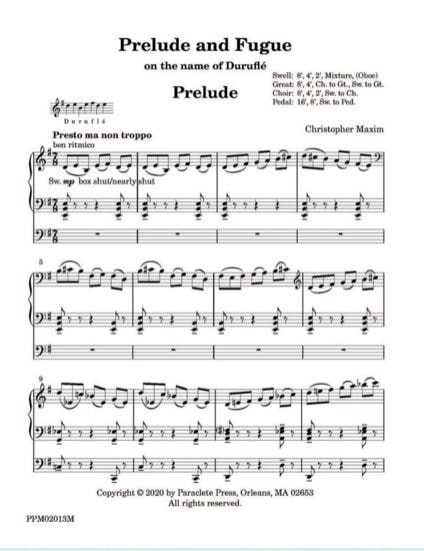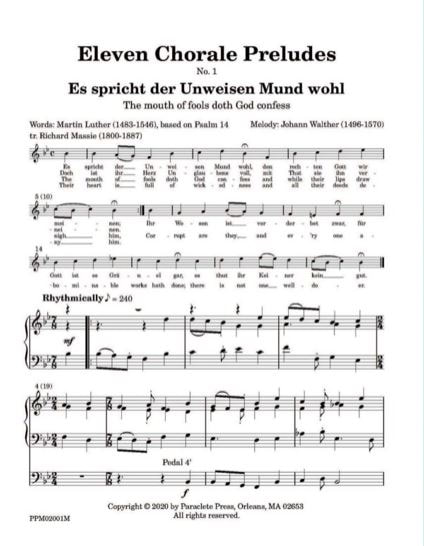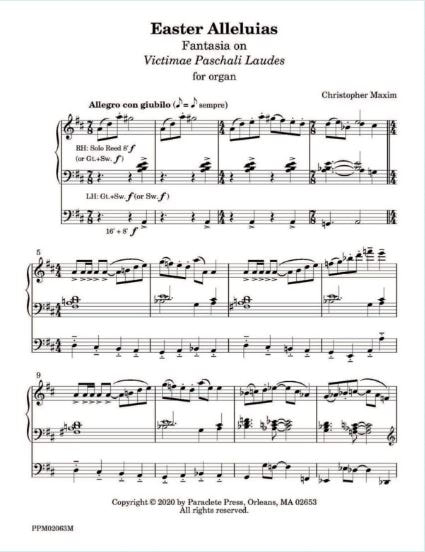Instrumental Music/Organ
|
Toccata Nuptiale
(1993) |
This popular work combines the style of a French toccata (particularly the language of Vierne) with the old music-hall ballad 'Daisy, Daisy, give me your answer, do'. It was written for the wedding of a friend who was a cycling enthusiast and premièred by the composer in the United Reform Church in Heswall, Wirral. Since then it has been performed around the world and has been recorded commercially four times. It is regularly performed by Michael Stairs on the organ of the Wanamaker Store, Philadelphia, USA and by Dr John Kitchen on the organ of the Usher Hall. Toccata Nuptiale is on the diploma syllabus of the London College of Music. Michael Stairs's recording was featured in the programme Pipe Dreams on American Radio in August 2017.
|
There being no just cause or impediment to the contrary, Christopher Maxim makes a daring liaison between the music-hall ballad 'Daisy, Daisy' (on pedals) and the grand organ style of Vierne (on manuals) in his Toccata Nuptiale, written for the wedding of a friend whose passions include cycling. The result, which moves along way from the organ loft of Notre Dame, is a splendid addition to the repertoire of wedding music and of light-hearted concert works - and is much simpler to play than a real Vierne toccata! Stainer & Bell
Audiences, congregations even, will love it – and you, and the organ, and the composer. Every [organist] of the requisite standard should order a copy without hesitation. Graham Matthews (Organists’ Review)
This splendid piece has been out for some while, but if you have not seen it, or, better, bought it, remedy the situation without delay: it is a guaranteed noise-stopper, tremendous fun to perform and to hear. Trevor Webb (Church Music Quarterly)
This delightful piece… [is suitable for] joyful liturgical occasions [and] it would make a good light-hearted recital piece. CN (The Organ)
Christopher Maxim’s Toccata Nupitale is clearly angling to become a bridal favourite to match some of the better-known (and hackneyed) pieces. Maxim has counterpoised a Vierne-like Toccata with the once-popular song written by Harry Dacre in 1892 ‘Daisy Bell’. (Daisy, Daisy / Give me your answer, do. / I'm half-crazy / All for the love of you…’ concluding with the line ‘a bicycle built for two.’) Seemingly, the present toccata was composed especially for a cyclist friend! It is witty, fun and clearly not a cinch to play. John France (British Classical Music -- The Land of Lost Content; reviewing John Kitchen's performance on The Usher Hall Organ vol. II)
|
|
Recessional
(1996) |
Originally called 'Wedding March', this piece was composed for the Wedding of Alastair & Louise Crammond. Premiered by the composer in the Methodist Church in Heswall, Wirral it underwent some revision in 2020
|
|
Suite
(2003) 1 Intrada 2 Aria 3 Fugue 4 Scena 5 Toccata-Sortie |
Premièred by the composer in a recital at St Matthew’s, Bethnal Green, London
|
A major organ work, reminiscent of French models, in five movements: Intrada, Aria, a gigue-like Fugue, Scena (a recitative) and a fiery Toccata-Sortie. A challenging and exciting concert work in an early 20th century harmonic style. Paraclete Press
Both pieces [Easter Alleluias and Suite for Organ] show Maxim to be a composer of real inventiveness, with a strong and secure command of writing for the organ. His music shows a wide range of stylistic influences, including British composers of the later 20th century, such as Leighton and Mathias in the first two movements of the Suite, neo-Baroque writing in its fugue, and the vibrant manual textures of the late-Romantic French toccata. Martin Clarke (Organists' Review)
|
|
Variations on Falcon Way
(2006) |
The theme is one of the composer’s own hymn tunes, published in The Hymns and Letters of Ann Griffiths (Stainer & Bell, 2000)
First performed by the composer in a concert at the Parish Church of St Dunstan and All Saints, Stepney, London, the work has subsequently received numerous further performances, including by Andrew Wilson in a recital at Bath Abbey |
|
Invocation and Paean
(2006) |
First performed by the composer in a recital at the Parish Church of St Margaret, Lee, London
|
|
Prelude and Fugue
(2008) |
First performed by the composer at the Parish Church of St Margaret, Lee, London.
Other performances include the Annual Festival of New Organ Music at St Marylebone Parish Church |
|
Fanfare on CANADA
(2009) |
Composed for the Centenary of the Royal Canadian College of Organists and premiered by the composer at St Marylebone Parish Church in the 2009 Annual Festival of New Organ Music
|
|
Processional
(2011) |
Commissioned by Mr Andrew Colley and Miss Vanessa Hare as the Bridal March for their wedding (July 2011) and premièred by Duncan Atkinson
|
Quite by chance I had just dug out my copy of Christopher Maxim's Toccata Nuptiale, a splendid pastiche on 'Daisy, Daisy' and I had been wondering if there would be any more to come when this Processional arrived. It is a fairly short, tuneful and not too serious wedding processional, which will be welcome listening on many other occasions. A lively, well-articulated manual touch is needed, and confident, well-marked pedal playing -- nothing too difficult, though. Well worth the modest price. Trevor Webb (Church Music Quarterly)
Processional was written for a wedding and could be used as the bride enters or as a postlude, although neither is specified. It starts with a trumpet flourish which is followed by a jaunty march. This leads to a cantabile middle section which goes through several keys rather restlessly before ushering in a repeat of the opening march theme. This gives way to a final version of the opening trumpet theme, this time scored for full organ. An effective occasional piece, not difficult to play. Alan Spedding (Organists' Review)
|
|
Three pieces founded on Welsh hymn tunes
(2011) 1 Prelude (Aberystwyth) 2 Intermezzo (Blaenwern) 3 Toccatina (Trefaenan) |
Premièred by the composer at a recital in St German's Church, Cardiff, on 28th October 2011
|
Maxim has set these three works as hymn "fantasias" with much color and textural variety. The tunes are Paraclete Press
Aberystwyth: It's a striking piece, and well-suited to big occasions. David Dewar (Organists' Review)
This clutch of works from Paraclete Press[Prelude and Fugue on the name of 'Duruflé', Three Pieces Founded on Welsh Hymn-Tunes, Eleven Chorale Preludes, Jubilate] showcases Christopher Maxim’s fluent and charming compositional style. His North Walian heritage inevitably draws comparison with William Mathias: certainly there is the same Celtic brightness but it is softer-edged, more approachable and even jaunty. Jubilate has none of the granitic insistence or blinding sunlight of Mathias’s composition of the same name, but instead is an engaging and bouncy ball of fun. There is idiomatic, enjoyable and satisfying music in these volumes. Huw Morgan (Sunday by Sunday)
|
|
Jubilate
(2012) |
Composed at the request of Brian Williams, Organist of St German's Church, Cardiff
|
This is a genuine, large-scale scherzo movement that will delight both organist and listener. The multi-meter style is complemented by endless variations of colour. Great fun! Paraclete Press
Jubilate is a bravura single movement [that] achieves its task well! David Dewar (Organists' Review)
This clutch of works from Paraclete Press[Prelude and Fugue on the name of 'Duruflé', Three Pieces Founded on Welsh Hymn-Tunes, Eleven Chorale Preludes, Jubilate] showcases Christopher Maxim’s fluent and charming compositional style. His North Walian heritage inevitably draws comparison with William Mathias: certainly there is the same Celtic brightness but it is softer-edged, more approachable and even jaunty. Jubilate has none of the granitic insistence or blinding sunlight of Mathias’s composition of the same name, but instead is an engaging and bouncy ball of fun. There is idiomatic, enjoyable and satisfying music in these volumes. Huw Morgan (Sunday by Sunday)
|
|
Elegy
(2013) |
An adaptation of 'A Sad Pavan' (piano solo composed in 2001)
|
A moving and brief organ work with a slow-march rhythm. Great harmonic interest and appropriate for funerals and solemn occasions. Paraclete Press
Only two pages long, the Elegy is characterised by some noticeable harmonic shifts […] There are some elegant filigree decorations periodically that, gesturing to the Baroque, take us in a different direction from the harmonies. I am not sure I would try something so chromatically daring in a funeral or memorial service but there is a distinctive and characterful voice here that would work well in a recital. Francis O'Gorman (Organists' Review)
Some elegies are resigned, calming pieces, but this one has a yearning, restless feeling after the opening eight bars that is not dissipated by the quiet ending. The sadness of whatever sparked the elegy permeates the music, but in a haunting and bitter-sweet way. It is a short piece that compresses a lot into its 26 bars. Duncan Watkins (Sunday by Sunday)
|
|
Prelude and Fugue on the name of Durufle
(2014) |
The Fugue (composed first) was premièred by the composer after Choral Evensong at Southwark Cathedral on 5th July 2014
The complete piece was premièred after the Advent Carol Service at St Margaret's, Lee on 30th November 2014, and subsequently played after choral Evensong at Chichester Cathedral in May 2015 |
This ingenious concert work is based on the letters of Duruflé's name. The perpetual motion prelude is mainly in 7/8 while the fugue is full of verve and excitement leading to a grand conclusion. Paraclete Press
This clutch of works from Paraclete Press[Prelude and Fugue on the name of 'Duruflé', Three Pieces Founded on Welsh Hymn-Tunes, Eleven Chorale Preludes, Jubilate] showcases Christopher Maxim’s fluent and charming compositional style. His North Walian heritage inevitably draws comparison with William Mathias: certainly there is the same Celtic brightness but it is softer-edged, more approachable and even jaunty. Jubilate has none of the granitic insistence or blinding sunlight of Mathias’s composition of the same name, but instead is an engaging and bouncy ball of fun. There is idiomatic, enjoyable and satisfying music in these volumes. Huw Morgan (Sunday by Sunday)
|
|
Eleven Chorale Preludes
(2017-2019) 1 Es spricht der Unweisen Mund wohl The mouth of fools doth God confess (2017) 2 Was Gott tut, das ist wohlgetan Whate'er my God ordains is right (2018) 3 Wie schön leuchtet der Morgenstern How brightly shines the Morning Star (2018) 4 Wenn wir in höchsten Nöten sein When in the hour of utmost need (2019) 5 Nicht so traurig, nicht so sehr Do not be so sad, my heart (2018) 6 Christ lag in Todesbanden Christ Jesus lay in death's strong bands (2018) 7 Was mein Gott will, das g'scheh allzeit The will of God is always best (2018) 8 Kommt, Seelen, dieser Tag Come, Christian souls, and sing (2019) 9 Ach Gott, erhör mein Seufzen und Wehklagen Give ear, O Lord, and mark my sore complaining (2019) 10 So wünsch ich mir zu guter Letzt I wish that my last hour may be (2018) 11 O Welt, ich muß dich lassen O world, I now must leave thee (2018) |
'Es spricht' won the Audience Vote in the Royal College of Organists/Orgelbüchlein Project Competition on 8 July 2017 and was the catalyst for the collection of 11 chorale preludes. There are 11 pieces in tribute to Brahms's set
|
Written in various styles, this set features preludes on both familiar and unfamiliar Lutheran chorales. While influenced by the past, these are written in a fresh manner, attractive and useful for both listener and organist. Paraclete Press
An engaging collection. Martin Clarke (Organists' Review)
This clutch of works from Paraclete Press [Prelude and Fugue on the name of 'Duruflé', Three Pieces Founded on Welsh Hymn-Tunes, Eleven Chorale Preludes, Jubilate] showcases Christopher Maxim’s fluent and charming compositional style. His North Walian heritage inevitably draws comparison with William Mathias: certainly there is the same Celtic brightness but it is softer-edged, more approachable and even jaunty. The Eleven Chorale Preludes, all on German melodies, allude to Brahms’s Op.122 in texture, gesture and scale. Of these, the gentle, chromatic setting of ‘Wenn wir in höchsten Nöten sein’ is particularly intense and affecting. There is idiomatic, enjoyable and satisfying music in these volumes. Huw Morgan (Sunday by Sunday)
|
|
Easter Alleluias
(2019) |
Fantasia on Victimae Paschali Laudes
|
Both pieces [Easter Alleluias and Suite for Organ] show Maxim to be a composer of real inventiveness, with a strong and secure command of writing for the organ. His music shows a wide range of stylistic influences, including British composers of the later 20th century, such as Leighton and Mathias [...] Martin Clarke (Organists' Review)
|
|
Arrangement of Leroy Anderson's
Sleigh Ride (2019) |
Adapted from David Humphreys' transcription for organ; arranged as a duet for two organs (grand organ and chamber organ), with a couple of special additions towards the end...
The live performance on this video is far from ideal because the two instruments are not in balance owing to the position of the video camera |
Available from the composer
|
|
Three Heroic Encores
(2020) 1 Danger Mouse 2 Hong Kong Phooey 3 Inspector Gadget |
For use as a 'lollypop' encores, or playable together
|
Available from the composer
|
|
Exultate
(2021) |
Premiered by the composer in Chelmsford Cathedral
|
|
Dominus Regit Me
(2021) I vv 1-3 II v 4 III v 5 IV v 6 |
Meditation on Psalm 23
Premiered by the composer in a recital at St Mary Magdalene's, East Ham |
Score Exchange
To be published by Paraclete Press |
|
Lumen Christi
(2022) 1 Vexilla Regis prodeunt 2 Ubi caritas et amor 3 O salutaris Hostia 3 Pange lingua gloriosi 4 Ad cenam Agni providi 5 Adoro te devote 6 Aurora lucis rutilat |
Seven plainsong settings
|
|
Prelude on 'Summer suns are glowing'
(2023) |
|
Adoration at the Crib
(2023) |
A performance by Steven Maxson:
|
|
Prelude on 'Picardy'
(2023) |
|
Two Chorale Preludes on 'Sei gegrüßet, Jesu gütig'
(2024) 1 à 2 claviers et pédale 2 à 2 claviers et pédale - alio modo |
Commissioned by William Whitehead for the Orgelbüchlein Project
|
